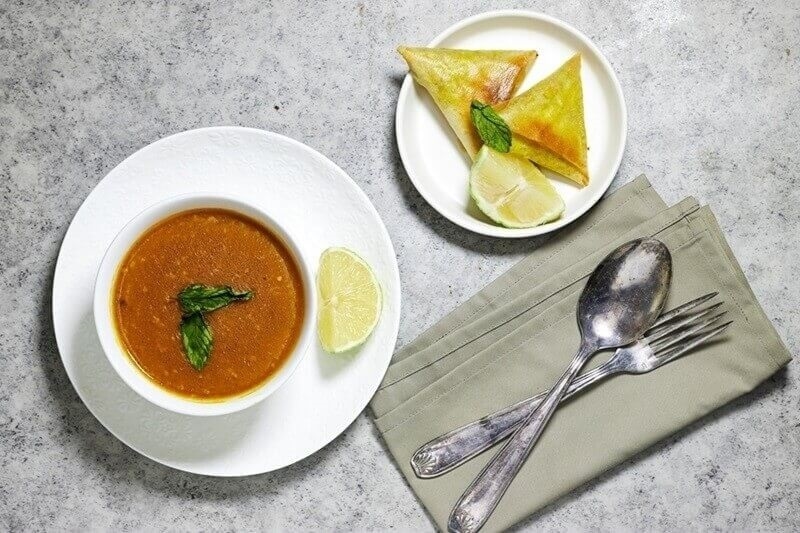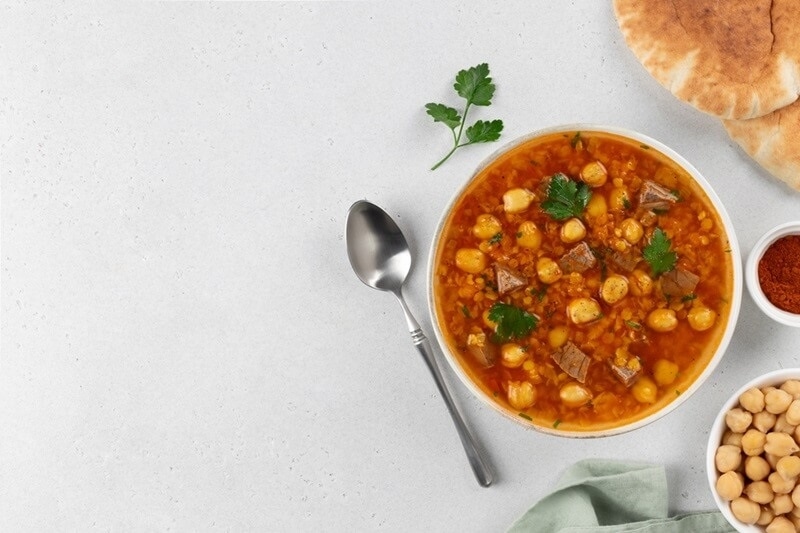
When talking about comfort food with a heavy heart, Algeria is loaded with tasty meals, but hardly any of its dishes can compete with the warmth and heritage of harira soup Algeria. This thick, red-lentil soup is an absolute favorite, particularly during Ramadan, the holy month.
In this blog, we will discover the story behind the meal that is most loved, learn about its cultural significance, and receive guidance on preparing it in our own kitchen. If you are a real fan of Algerian soups or you just want to have a spicy North African touch in your kitchen, harira is the right place to begin.
Harira soup Algeria is the very core of the country's food culture — rich, hearty, and made with love. It is a meal that mirrors the heritage of Algeria, comprising Berber and Arab traditions and Mediterranean flavors. Usually, the base is made of tomatoes, lentils, chickpeas, and a variety of spices that not only give the soup a bright color but also give it a warm flavor and great taste.
Harira's main strength is its polyvalence. Even though it’s the leading soup in Algeria, each province and even each household has its special recipe. Some people like it so dense that it looks like a stew, whereas some keep it thin and perfect for a bowl. The interplay of different consistencies, i.e., the soft lentils and the slightly firm chickpeas, makes each scoop delicious.
In Ramadan, harira soup in Algeria becomes more symbolic than ever. It’s most likely the first thing to be eaten when the fast is broken after sunset. The dish is made up of warm and nourishing elements; thus, it is very energizing but in a gentle way. Therefore, it is one of the most representative Ramadan dishes Algeria is known for.
At that period, harira is not merely food; it stands for the coming-together of people. Family members sit together with hot bowls in hand, engaging in their laughter and prayers. The smell of the cooking soup spreads around the house, hence it is a sign that the period of fasting has ended and that of feasting is here. It is an age-old custom that comforts and delights millions.
Just a few of the reasons why harira is perfect for Ramadan are:
The eternal link between the meal and the holy month is what makes harira one of the most loved dishes in Algerian gastronomy.

Despite being generally considered to be one of the best Algerian soups, harira’s origins are somewhat different from what most people think. Its roots are widely considered to be the Maghreb area, which, besides Algeria, also comprises Morocco and Tunisia. The word harira derives from the Arabic word “harir,” which literally means “silk,” and is used to denote the smoothness of the soup when it is done perfectly.
In the long history of harira, the recipe has changed on its journey from one place to another and from family to family. Every region takes a different approach — some might decide to use lamb to make the dish more delicious, while others might decide to use more herbs or different grains. Yet, the core of harira is the same: the mixture of earthy lentils, fragrant spices, and delightful tomato broth is always there.
One of the main factors contributing to a real harira soup in Algeria is its unique mixture of spices. Besides revealing its characteristic warmth to the dish, the spices are what give the dish its North African identity. The generalized spices are turmeric, ginger, cinnamon, and black pepper, and the whole lot of them are responsible for giving the dish a one-layered and complex aroma and flavor, of which they are all co-creators.
These are the main spices that are often added to harira:
Besides making great taste enhancers, the above ingredients also make harira a healthy and tasty dish, which is the true representation of comfort food Algeria is known for.
In Algeria, sharing food is a loving gesture, and harira is a perfect example of that commitment. During Ramadan and festive times, harira made in large pots is shared with family, friends, and even neighbors. It is customary for families to share harira portions with others as a sign of friendship and generosity.
The fact that it is shared implies that harira is not only an Algerian soup, but also a part of the cultural heritage of the people. Food is indicative of all the fundamental social principles of the community (hospitality, love, and mutual support). Connecting with the past through the present, each spoonful is full of history, the memory of family, and the warmth of human interaction.
Making harira soup in your home in Algeria is certainly not difficult. Traditional ones, which require hours of cooking, can be replaced with a fast and tasty version in your own kitchen with simple ingredients.
The ingredients you will need to prepare the meal are:
1 cup of lentils
Harira soup in Algeria has a definite base, but the differences in it from locality to locality make it worth discovering. For example, the soup in coastal areas may come with seafood as an accompaniment to the traditional flavors. Likewise, in southern regions, the addition of extra chili or cumin may be used to reflect local spice preferences.
These regional changes have made harira the most diverse Maghreb soups. With every turn, one can find a new tale - from the spicy Algerian recipes handed down for ages, to the trendy creations by young cooks who have added their artistic touch.
While it is true that harira is the most famous among the dishes served during Ramadan, Algeria celebrates it all year round. In fact, many Algerians prepare it in the cold season as a way of keeping themselves warm and nourished. Its combination of lentils and chickpeas is so hearty that it can easily be called a complete meal.
It is also a staple at family gatherings and special occasions, where it is served along with dates or fresh bread. What this dish basically does is to prove that it is suitable for both festive and everyday contexts — a timeless appeal of the most comforting and versatile Algerian soups.
In Algeria, Harira soup signifies comfort, community, and continuity. In fact, it is the first to bring people together from all communities - from the lively, noisy kitchens in Algiers to the underprivileged or rural houses - through its inviting smell and restorative taste.
The tale does not stop there - it comes from a long line of Maghreb culinary tradition, and it is a reminder that food is a means to connect us to our culture and each other. Whether you do it during Ramadan or on a cold evening, the soup is an offer of Algeria’s warmth and generosity to you in every spoonful.
This content was created by AI